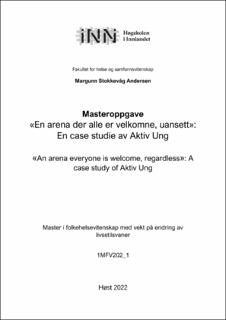«En arena der alle er velkomne, uansett»: En case studie av Aktiv Ung
Master thesis
Permanent lenke
https://hdl.handle.net/11250/3019316Utgivelsesdato
2022Metadata
Vis full innførselSammendrag
Bakgrunn: Det anses at samfunnet blir dyrere og rikere. Dette påvirker at barn og unge fra lavere sosiale lag deltar mindre i fritidsaktiviteter enn barn og unge fra høyere sosiale lag, da vi beveger oss mot et samfunn med mer sosiale ulikheter. Barn og unge bør få delta regelmessig på minst en fritidsaktivitet uavhengig av foreldrenes sosiale og økonomiske situasjon. Deltakelse i organiserte fritidsaktiviteter er for barn og unge forbundet med en større sannsynlighet for en sunn tilpasning senere i livet, samt en rekke andre helsefordeler. Teori: Teorien som er tatt i bruk her er eksisterende forskning og litteratur. Det teoretiske grunnlaget vil omfatte teori fra Bourdieu, med fokus på kapitalbegrepene og habitus. Metode og formål: Gjennom et kvalitativt casestudiedesign av et fritidsaktivitetstilbud i en norsk by hvor formålet var å; forstå hvem som deltar i Aktiv Ung, hva som kjennetegner dem og forstå hvordan Aktiv Ung fungerer.
Resultater og konklusjon: Denne studien tyder på at fritidsaktivitetstilbudet Aktiv Ung kan bidra til å utjevne sosiale ulikheter i fritidsdeltakelse blant unge. Den statlige støtten som gjør det mulig å gjennomføre tilbudet tilnærmet gratis er et viktig element her. Studien peker også på at Aktiv Ung fungerer som et alternativ til organisert idrett som en sosial arena da ungdommen danner vennskapsbånd gjennom aktivitetene som gjelder også utenfor den organiserte gjennomføringen. Samtidig viser funnene at det allerede eksisterer en viss form for idrettshabitus blant deltakerne i Aktiv Ung, og det er uvisst hvor godt tilbudet treffer de som ikke har drevet organiserte aktiviteter tidligere. Det er derimot antydninger i funnene om at Aktiv Ung gir mulighet til å opptjene seg en slags fysisk aktivitets-kapital fra bunn. Mer forskning er nødvendig for å kartlegge dette. Studien kaster også lys over hvor viktig lederne av et slikt program er for opplevelsen av tilbudet.
Nøkkelord: Fritidsaktiviteter, ungdommer, fysisk aktivitet, kapital, habitus, Bourdieu Background: It is considered that society is becoming more expensive and richer. This affects children and youth from lower social strata participating less in leisure activities, than children and youth from higher social strata, as we move towards a society with more social inequalities. Children and youth should be allowed to participate regularly in at least one leisure activity, regardless of the parents' social and financial situation. Participation in organized leisure activities is for children and youth associated with a greater probability of a healthy adjustment later in life, as well as several other health benefits.
Theory: The theory applied here is existing research and literature. The theoretical basis will include Bourdieu's theory, focusing on the concepts of capital and habitus.
Methods and aim: Through a qualitative case study design of a leisure activity offered in a Norwegian city where the purpose was to; understand who participates in Aktiv Ung, what characterizes them, and understand how Aktiv Ung works.
Results and conclusion: This study indicates that the leisure activity offered by Aktiv Ung, can contribute to leveling out social inequalities. The state support that makes it possible to carry out the offer almost free of charge is an important element here. The study also points out that Aktiv Ung functions as an alternative to organized sports as a social arena, as the youth form bonds of friendship through the activities that also apply outside the organized implementation. At the same time, the findings show that there is already a certain form of sports habit among the participants in Aktiv Ung, and it is uncertain how well the offer hits those who have not run organized activities before. On the other hand, there are hints in the findings that Aktiv Ung provides an opportunity to earn a type of physical activity capital from scratch. More research is needed to map this. The study also sheds light on how important the leaders of such a program are for the experience of the offer.
Keywords: Extracurricular activities, youth, physical activity, capital, habitus, Bourdieu
